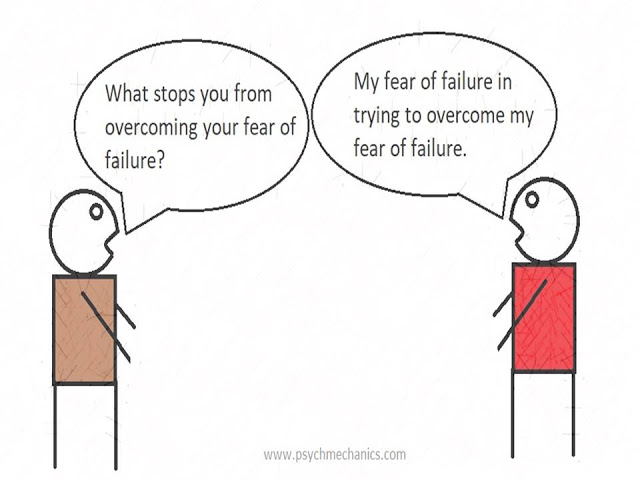Many motivational speakers and self-help gurus lambast the fear of failure as if it’s some kind of a curse on humanity. Hardly anyone ever points out why we have this fear in the first place and, dare I say, the potential benefits of having this fear.
I’m strongly against lambasting human emotions because that way you rob yourself of the opportunity to understand them. When you demonize emotions, you’re no different than a child putting fingers in her ear and screaming- refusing to listen to what anyone has to say.
To overcome the fear of failure, one has to understand how and why this fear is triggered. You can’t just jump out of bed one day and declare, “From today, I’ll be free from the fear of failure”. It doesn’t work that way.
Also, trying to program your mind by repeating to yourself that you’re free from the fear of failure is an equally irrational and inefficient approach.
Fear of failure and huge costs
If I ask you to make a cup of coffee and you’ve made coffee hundreds of times before, will you experience a fear of failure in doing this task? Of course not. You’ve done the same task enough times to convince your mind that you can make a good cup.
More importantly, even if you do fail to make a good cup, the costs incurred will be low. You’ll waste a small amount of milk, and some grams of coffee powder, and perhaps I’d perceive you as a bad coffee maker (not a blunder in my book).
Now, if I ask you to partner with me in a new business venture, it’ll be a different story altogether. I’ll demand a lot of your time, energy, and funds to get the business up and running.
The potential costs for you, in case the business fails, are going to be huge. If you don’t think the business has the potential to succeed, you’ll experience a fear of failure and decide not to partner with me.
So the fear of failure is triggered in us when we believe that the activity we’re thinking of pursuing has the potential to incur huge costs for us. This not only applies to starting a business but to everything in life, from public speaking to approaching a crush.
No one would fear public speaking if they didn’t fear the negative consequences of failing and no one would have any problems approaching their crush if they had no fear of getting rejected. Getting rejected by the people listening to their speech and by their crush is a loss too much to bear. Hence the fear.
Minimize the costs
If the fear of failure is caused by the perception of huge potential loss, then the only logical way of overcoming this fear is to minimize potential loss.
Minimizing or eliminating the potential costs would make the activity less risky and the fear of failure will ease or even disappear. One way to minimize costs and risk is to not keep all your eggs in the same basket.

Again, using the example of starting a business, it might be a good idea to start multiple businesses and see which of them succeeds instead of putting all your energy, funds, and time into just one business.
For instance, even after this website took off, I continued to pursue my education because I wanted to keep my options open.
Similarly, there are people who date multiple partners simultaneously to minimize the risk of investing in just one partner, in case the investment fails.
However, there’s a danger that the partners may find out that they’re options and people generally don’t like to be options. So the person dating multiple people simultaneously risks losing all of them if their cover is blown.
Similar dangers exist in the business world in particular and life in general. If you invest in multiple businesses, you may end up not investing enough in a single business to make it successful.
Your strategy to minimize costs may backfire on you. Also, the sense of safety gained from knowing that you’ve not put all your eggs in the same basket may lead to you become complacent.
If you only have one business, it’s likely that you’ll work your ass off to succeed. Thanks to the fear of failing in the business because if you fail, you lose everything. There’s a lot at stake.
Fear of failure can be a powerful motivator
Fear of failure is bad only when it prevents you from starting things. From what we observe in people, fear of failure does more good than harm. When the date of the exam approaches, it is the fear of failure or scoring low that motivates students to study.
When the deadline to submit the project report approaches, an employee fires all his engines to get the work done on time. Somehow, the motivational speakers never mention any of this when they’re lambasting this fear.
The key is to understand that if you’re experiencing a fear of failure in starting something, it’s probably a reasonable fear because you’re not convinced that you’ll succeed.
By minimizing the costs and weighing the pros and cons of undertaking the project, you can ease your fear of failure. Once you get started, you can then use this fear to propel yourself forward.
